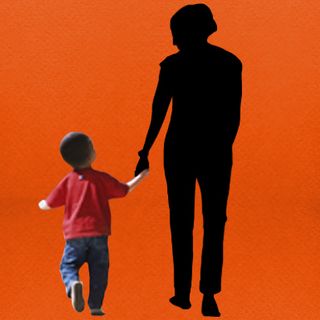
Consent Isn’t Just a Value; It’s Also a Set of Skills
Building kids’ consent skills early is essential — but it can also be a minefield for parents.

India’s nascent #MeToo movement has made evident how extraordinarily difficult it is to speak up about sexual harassment and abuse, and by extension, how difficult it is to stop — or even recognize it — as it is happening. Which suggests a deep need to actively teach children about consent, so they can grow into consenting adults.
Teaching consent doesn’t have to involve even mentioning sex in early childhood. But educating ourselves on a topic that is ultimately connected to sex does require us to overcome our own discomfort and misinformation — which is no small feat. It is also overwhelming to deliberate on our everyday treatment of our children’s bodies, knowing it will impact how they exercise consent and engage in sexual intimacy. But children learn about consent not only through what we say about it, but also through what we do not say or do. Ultimately, it is only by consciously and actively teaching consent that we can raise empowered adults who will engage in healthy sexual behavior in a healthy manner.
*
Consent is about bodily autonomy – that is, making independent choices about one’s body, whether in a sexual context, a medical context, or simply in the everyday context of appearance, lifestyle, diet, etc. It is also about a general attitude of respect, and an equal distribution of power, in any relationship or social exchange. This involves both people’s choices being respected, neither person feeling pressured to concede to the other’s wishes, and neither exerting control over the other. These are the descriptors of healthy boundaries in any relationship or interaction — not just a sexual one.
Related on The Swaddle:
The Legal Age of Consent Is A Global Gray Area
The skills that consent requires develop over time, and across different scenarios, in order to be effectively applied. Consent skills involve identifying emotions, identifying boundaries, decision-making, communication, and self-advocacy. To apply all of these skills in real time in sexual situations that are often awkward and confusing, is a big ask — especially for young adults who are new to dating and intimacy. Talking about consent only in adolescence and only as ‘sexual consent,’ doesn’t give kids enough time to develop and practice all of these skills, leaving them to fall back on internalized, and often conflicting, messages about gender and relationships.
When we start teaching concepts like bodily autonomy and respect early — i.e., consent in its most basic form — we protect kids against some of that dangerous gender-based socialization. We protect them against child sexual abuse. And we lay the foundation to prevent abuse of others – children and adults — in the future.
*
I was a counsellor at a school for children with special needs, and we taught the youngest ones aged 8 to 10, the concept of “my body belongs to me”: Your parents/family are responsible for you because you’re not an adult yet, and so they help you take care of your body. But it’s your body; it’s not theirs, it doesn’t belong to them — it belongs to you. We also discussed privacy: that certain parts of your body are “private,” and what that means; that you can only touch your penis/vagina when you are alone; that you must respect others’ personal space; and what kind of touch is appropriate and from whom.
During these conversations, children’s questions arose almost exclusively from their observations of how different people treat their bodies in everyday life — during play with friends, when an older sibling fights with them, how a carpool driver holds their hand when crossing the road, how mom helps with certain things because mom is also a girl. They were naturally applying these concepts to everyday situations, even when we weren’t connecting the dots for them. Children learn the most through experience, which is why it’s important to have ongoing, evolving conversations as they experience new and varied day-to-day situations, and as their bodies and their understanding of the world develop.
How do you teach bodily autonomy when sometimes, as a parent, you have to make your toddler brush her teeth when she doesn’t want to?
But building consent skills can and should start much younger than age 8. From the ages of 1 to 4 years, children begin to explore their own bodies, become curious about other’s bodies, and become aware of gender differences. In terms of cognitive and emotional development as well, from 2 years onward children begin to see themselves as a separate person and seek independence — their natural need for autonomy starts developing, which can and should be fostered.
However, this often puts parents in a difficult position. While consent skills are critical to kids’ healthy development, there’s a reason children require guardians. How do you teach bodily autonomy when sometimes, as a parent, you have to make your toddler brush her teeth when she doesn’t want to?
*
Sex educator Monica Rivera, in her TED talk, shares about how teaching her sons about consent often becomes the ammunition they use against her, when they say things like, “I don’t want to go to school today — my body, my choice.” Parents can navigate situations like this by breaking down why certain things are necessary, or why children do not get to decide. We can also compromise and provide some level of autonomy — maybe kids make a decision based on options given to them, or they can carry out one part of a task independently instead of the whole task.
Rivera also highlights the fact that we’re already teaching some boundaries — if at a restaurant, a child were to eat off of a stranger’s plate, or steal another child’s toy, we would clearly identify that as not okay and intervene. So it’s a matter of expanding our teaching to include body-related boundaries. We’re already teaching skills like sharing, taking turns, being kind — behaviours that are to do with respect and reciprocity, just like consent is. And we don’t learn them by having one conversation, just like we cannot learn consent by having “The Talk”, which is one-time only.
Related on The Swaddle:
More Evidence Having ‘The Talk’ With Kids Once Isn’t Enough
Our socio-cultural context can also make teaching consent skills difficult. Indian family values dictate that older people are inherently deserving of respect, and so the wishes of young people aren’t respected as much; non-compliance with expectations of physical affection is taken personally and considered offensive. Concern and caring are often confused with control, and families feel entitled to participate in the body-related decisions their children make — from tattoos and piercings, to how they dress, to how much weight has been lost or gained.
This is especially so for girls; in our country’s culture, and that of most other countries, as a child’s gender becomes a prominent part of their identity and appearance, there are unspoken ‘rules’ that are imposed. As their bodies develop and start to appear ‘feminine’, the onus is put on them to not garner unwanted attention: they must (not) act a certain way, (not) look a certain way. But what we don’t tell them — as Tarana Burke, founder of the #MeToo movement points out — is that when those rules are broken, it’s not their fault.
Enabling a child’s autonomy in this social atmosphere is all the more challenging, and necessary, and parents and educators indirectly take on the mantle of challenging social norms. When relatives or other adults do not respect a child’s choice, or coerce them into reciprocating physical affection, the message the child receives is that their choice and voice do not matter, and they have no power. It is important for parents to then acknowledge that the child’s autonomy has been disregarded; they have been disrespected. By doing so, we help insulate them from internalizing the negative message they have received. Instead, we are reinforcing that they should continue to identify and voice what is not comfortable for them, and that they are not wrong for not wanting what was expected of them or forced upon them.
*
It is hard to relinquish control and provide autonomy and independence, whilst also providing sufficient support. But we are already teaching children certain aspects of consent, and children are already learning about it through other means if we aren’t teaching it. Given the implications, it’s worth investing the time and effort — little by little, we can teach ourselves as we teach our children.
Sneha Rawlani is a psychotherapist-in-the-making, and has worked as a school counselor for children with special needs. An exhaustingly empathetic person and a moderately skeptical optimist, she writes to create awareness and change around the things that she can’t help but notice are wrong with the world, and can’t help but hope will get better.
Related


Is This Normal? “I Have a Weird Fascination With Celebrity Airport Style”
